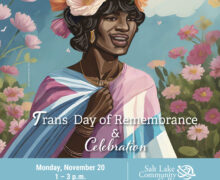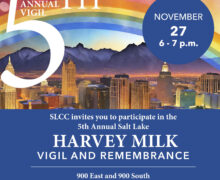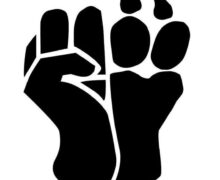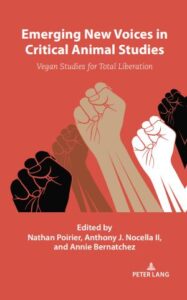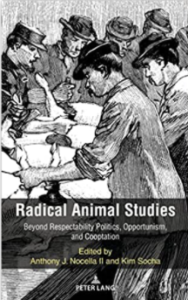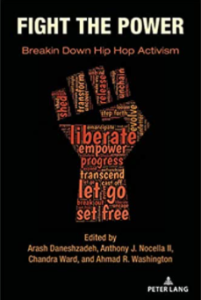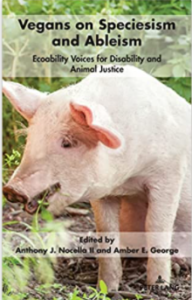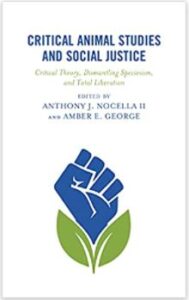April 3, 2021 – 6th Annual Students for Critical Animal Studies Conference
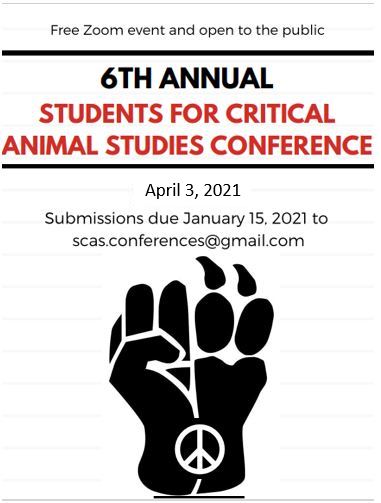
April 3, 2021
6th Annual Students for Critical Animal Studies Conference
Watch the conference here:
6th Students for Critical Animal Studies Conference 2021 – YouTube
Conference Organizer:
Nathan Poirier
(Graduate student of sociology at Michigan State University)
About the Students for Critical Animal Studies and the 6th Annual Students for Critical Animal Studies Conference
The Students for Critical Animal Studies (SCAS), rooted in animal liberation and anarchism, is an international association of students, from high schools to online colleges to graduate schools, dedicated to the abolition of animal and ecological exploitation, and to dismantle all systems of domination and oppression, in hopes for a just, equitable, inclusive, and peaceful world. SCAS challenges students to view social justice from a more inclusive and intersectional perspective, while providing a forum for the meeting of academia and activism.
This 6th annual conference will provide a platform for students, activists, and professors to critically assess the animal liberation, oppression, and domination theoretically and empirically. Our hope is that the conference will encourage both a productive reflection that challenges normalcy of systemic oppression that implements discrimination and networking among those who do academic and pragmatic social justice work.
10:00am-10:30am: Mariska Jung
Species-inclusive intersectionality: a new direction for political cooperation between animal and migrant parties in Europe?
Biography: Mariska Jung is a PhD student at the Vrije Universiteit Brussel (BE). She is based at the Department of Political Sciences and affiliated to RHEA, the university’s research center on gender, diversity and intersectionality. In addition, she is a member of the Race-Religion Constellation research hub at Radboud Universiteit Nijmegen, the Netherlands. Jung’s research is situated at the crossroads of political theory, critical animal studies, critical race theory and gender and queer scholarship. She graduated with distinction from SOAS University of London (UK) as well as from the University of Amsterdam (NL).
Abstract: Many European countries have witnessed a significant début following the results of their most recent national elections. For example, the animal party DierAnimal in Belgium and the migrant party DENK in the Netherlands. These débuts correspond with larger and increasing political success of animal parties as well as the organization of migrants or migration-related interests in political movements. At first sight, these newcomers seem to be worlds apart in their political views and the issues they represent. While some migrant parties ground their political analysis in intersectionality, animal parties generally refrain from any deep engagement with issues pertaining to gender and sexual diversity or racism. Nevertheless, both type of parties express fundamental critique on the current parameters of our economic system and call for radical change. They may even find topical congruence in their respective concern for environmentalism and migration in phenomena such as climate change refugees or the substandard working conditions of (often migrant) laborers in slaughterhouses. This begs the question; how can these parties be brought closer in ideological terms? Is there a way to envision a uniting political horizon that bridges their distances? The aim of this paper is to flesh out the theoretical (im)possibility of a species-inclusive intersectionality so as to identify the promises and limits of such a political analysis for possible cooperation between these parties. Ultimately this article concludes that, while theoretically limited, a species-inclusive intersectional political vision does open a window towards concrete and mutually beneficial political cooperation between animal and migrant parties.
10:30am-11:00am: Rafail Simoni
A psychological perspective on intersectional liberation
Biography: An undergraduate student in London at his final year, born in Greece from immigrant parents, aims to provide the historical and philosophical framework of hierarchical ranking that justified different oppressions, in an effort to deepen the understanding of their construction and establish whether the intersectionality of struggle has historical context.
Abstract: Ecopsychology aims to understand the lived experience of interrelationship between humans and nature. It responds to historical conditions, rejects the dichotomies of human/nature imposed by Western philosophy, science and art while accepting the psyche as an ecological and social phenomenon in which the psychopathology of human-nature relationship has estranged us from nature and humans. The concept of ecology is to see land as a community in which humans are members rather than its mere exploiters. The abuse of land, therefore, has caused an unconscious distress as part of our connection with the larger whole. Negative emotions arising from earth-threatening forces, makes this suffering collective and tends to be denied or repressed. The notion of ‘psychic numbing’ is part of an emotionally overwhelming reality that leads us to anaesthetize and dissociate ourselves from the inconvenient truth. Historically, western men of thought altered the world to fit their insecurity to serve their own purposes. The pathological fracture of modern society and the natural world, evident daily by the environmental destruction, is invisible to psychology. By granting the natural world a psychological status, the dichotomy of human and nature will cease to exist, embodying humans as part of nature. The rising exploitation of nature has been caused by a narcissistic process of despiritualization and an anthropocentric view of non-human beings. Psychology offers knowledge that can expose the other side of society, that of domestic abuse and political terror, and threaten these devastating effects if it becomes socially critical, by adopting a radical political attitude. Freud demonstrated that brutal social conditions in the Western culture, cause individual neurosis. Lack of historical dimension within contemporary psychology and their uncritical approach, reinforces many oppressive aspects of society.
11:00am-11:30am: Z. Zane Mcneill and Rebecca Eli Long
Toxicity and Multi-Species Disability in Duplin County, North Carolina
Biography: Rebecca Eli Long is a multidisciplinary scholar-activist who uses lived experiences of disability to imagine a socially just, sustainable future for all bodyminds. Rebecca Eli’s has an M.A. in Appalachian Studies from Appalachian State University, and they are currently a doctoral student in the Department of Anthropology and Center on Aging and the Life Course at Purdue University. Their research explores the links between disability, violence, and activism, with a commitment to applying disability justice principles in campus and community settings.
Biography: Z. Zane McNeill is an activist-scholar whose co-edited collection “Queer and Trans Voices: Achieving Liberation Through Consistent Anti-Oppression” was recently released by Sanctuary Publishers. Their second anthology, “Y’all Means All: The Emerging Voices Queering Appalachia,” is forthcoming from PM Press.
Abstract: Duplin County, North Carolina, the top hog-producing county in the United States, confines more than 18.5 million animals in Concentrated Animal Feeding Operations (CAFOs), more commonly known as factory farms. Residents near CAFOs complain of the smell and report headaches, stomach pains, anxiety, and depression. Factory workers, meanwhile, face high levels of PTSD and workplace injury. Factory farms in Duplin County and the surrounding area, considered part of the South’s “Black Belt” region, have contaminated local water and air supplies, causing human illness, such as “blue baby syndrome.” Duplin County exemplifies the eco-ability paradigm, which takes a cross-movement approach to animal rights, disability activism, and environmental justice. Using the eco-ability framework, as well as theories of ecological disablement and queer toxicity, this presentation expands the link between disability and animal rights to explore how animal farming is itself a disabling practice. Toxicity offers a lens to show the far-reaching impacts of multi-species disability. In conceptualizing the toxic body as an inherently queered space, we can imagine it as a site of resistance, connecting human communities affected by this toxicity to animals harmed in the mechanisms of violence, and the polluted environment. This presentation considers cross how cross-movement solidarity and total liberation can offer avenues of resistance in the toxic body–a space to trouble notions of the fit/unfit paradigm, subvert capitalist notions of productivity, and provide new ways to understand the non/human body
11:30am-12:00pm: Kiana Avlon
Alt-Vegan? An Exploration into the Far-Right Infiltration of Animal Rights
Biography: Kiana Avlon is a graduate student in Westminster College’s Master of Arts in Community Leadership program. She has presented research on the rhetoric surrounding houselessness in Salt Lake City and the root causes of speciesism at the Western Social Science Association conference and the Annual North American Conference for Critical Animal Studies. Kiana continues to study rhetoric as it pertains to speciesism with a focus on countering ecofascism within the animal liberation movement. She grounds her research in critical animal studies, anarchism, and ecofeminism with the goal of total liberation. Her free time is dedicated to volunteering at local animal sanctuaries.
Abstract: The far-right has taken an interest in infiltrating the mainstream animal rights movement. A timely example of the far-right’s influence in the animal rights movement is reflected in the leadership of the worldwide organization, Anonymous for the Voiceless (AV). This discussion consists of a case study that presents the perspectives of a group of activists in the Intermountain West who previously participated in Anonymous for the Voiceless Cube of Truths and left amidst racist comments from the leadership’s social media accounts. This dynamic will be contextualized within the larger issue of far-right infiltration of the animal liberation movement, which strips away intersectionality and any prospects of total liberation. This presentation utilizes data collected from interviews of activists conducted between November and December of 2020 that explored their perceptions of AV’s leadership, their social media content, and their opinions of the overall effectiveness of AV. The activists’ views on intersectionality, the political landscape of the movement, and thoughts on constructing an effective animal liberation movement are additional key findings. Understanding activists’ perspectives on single-issue animal rights organizations with right-leaning political streaks such as AV is crucial to (re)discover the history of the movement and return to its radical and liberatory roots.


